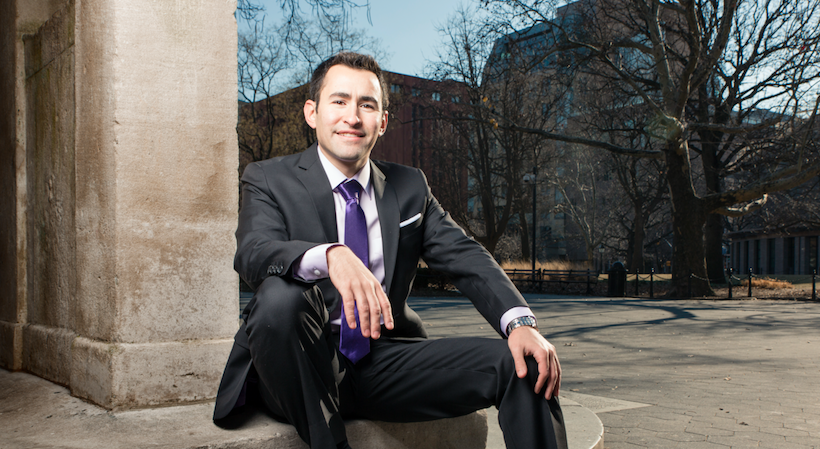As a partner and research director at HR research firm, Future Workplace, and managing partner at Millennial Branding, Dan Schawbel has his finger on the pulse of workplace and career trends.
His first two books, “Promote Yourself: The New Rules for Career Success” and “Me 2.0: 4 Steps to Building Your Future,” became bestsellers. Schawbel’s latest book, “Back to Human: How Great Leaders Create Connection in the Age of Isolation,” published by Hachette, is on sale today. The book features interviews with brand leaders from companies such as Starbucks and General Mills, along with Schawbel’s research on isolation in the workplace.
We caught up with Schawbel to find out why social connections in the workplace matter, how leaders can foster better connections and more. The following conversation has been edited for clarity and brevity.
StartupNation: What prompted you to write “Back to Human”?

Dan Schawbel: Every book I write helps people of our generation, millennials, get to the next phase of their career. I’ve written about community and social networking, but now I’m thinking we’re going too far with the technology that I (previously) told readers how to use.
The pendulum swung all the way in one part, now it’s swinging the other way. It’s like old-school is the new new-school. The question is, how do you stand out? Now, it is by making connections (via technology, rather than real-world). That’s really what I’m focusing on here.
I was interviewed for a documentary that’s coming out on Netflix next year. I was asked what the biggest challenges are for the generation. I went through the student loan crisis, which is now at $1.5 trillion, climate change, income inequality … and then I really was thinking, ‘We feel isolated because we’re constantly using technology.’ We can be around everyone and no one at the same time. We’re living in cities where you can be in the subway, you can be walking down the street, you can even be in a meeting and people could be physically there, but not mentally, emotionally, spiritually. There’s a big disconnect there.
I dug deeper into the research and there was a Cigna study of 20,000 adults in America. They found that almost half of adults are lonely. It’s really affecting the world, not just America. I really wanted to explore what is going on with social connections in the workplace.
From a leadership prospective, the goal is to create a more human workplace.
Related: Tips From Young Entrepreneur Council’s Ryan Paugh
StartupNation: Once you got into researching and writing the book, what surprised you during that process?
Dan Schawbel: Nobody ever talks about the dark side of working remotely, which I’ve experienced over the years. What we’ve found in research is that if you work remotely, you are more likely to be isolated and lonely.
The big finding was that if you work remotely, you’re much less likely to want to work at your company long-term.
So, to me, that’s important because if you’re not getting the face time, if you feel isolated, if you feel a weaker connection to your team and organization, then you’re more likely to change companies as a result.
We spend about 2,000 hours a year with our co-workers. If you don’t get along with your colleagues, and you don’t feel they’re supporting you and you don’t have a good relationship with them, you’re just more likely to leave. The best workplace cultures, in my research, are the ones where you feel like you’re a part of a family. It is much easier to leave a bunch of acquaintances or people you don’t like than friends and family members. And especially for people our age, they view their co-workers as the work family and managers as their work parents.
StartupNation: How does that apply to entrepreneurs, or people who are thinking about building a culture for a small but growing company?
Dan Schawbel: I think it’s even more important (for entrepreneurs), because if your team is only four people and you don’t get along, the company is going to fail. You cannot make mistakes as a startup. If you have 100,000 employees and some managers aren’t very good and some are very good, which usually happens, it’ll be okay. You’re probably not going out of business in the next year.
But if you’re an entrepreneur, and it’s either you and a business partner or a small team, you need contact. If there’s not enough face time, you’re not doing a company outing or a social event at all, you can’t afford to lose anyone because your business could crumble. It’s really dire at the smaller scale.
Sign Up: Receive the StartupNation newsletter!
StartupNation: How would you cultivate that sort of work family that you mentioned?
Dan Schawbel: What we found was that only 20 percent of companies actually have work outings and social events, or ‘work-cations,’ but that’s the number one way to foster a human workforce. These leaders are not making time for those social activities, they’re not prioritizing it, because they don’t realize it’s an issue that exists in the workplace. I think part of what I’m trying to do with this book is to show that this matters. If you have a more socially engaged workforce, people are going to stay with you longer and be more committed.
The big employment and engagement factors I discuss in the book are belonging, trust, purpose and happiness. We need all four of those to have a better engaged workplace culture where people are excited to come into work every day, they want to stay with the company long-term, and you can increase productivity that way.
StartupNation: Are there any other takeaways for entrepreneurs from your book or your recent studies?
Dan Schawbel: Because we’re spending so much time with people we work with, hire for personality. You have to not only think that people are qualified to do the job, but there has to be a personal connection there. You have to really want to be around that person, because as an entrepreneur, you’re going to be working with them seven days a week.
Because we’re spending a lot of time at work, because people are bringing their full selves to work whether we like it or not, we have to create a safe environment so that they can be themselves. People are people, not just workers.
“Back to Human: How Great Leaders Create Connection in the Age of Isolation” is available now at fine booksellers and can be purchased via StartupNation.com.






